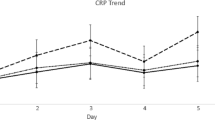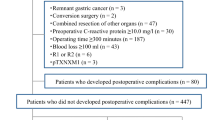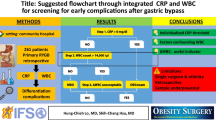Abstract
Background
The primary objective of this study was to evaluate the utility of CRP in early identification of post-operative complications after bariatric surgery. The ability of this marker to acutely predict post-operative complications in bariatric surgery patients has not been determined.
Methods
A retrospective chart review was conducted of adult patients who underwent a primary and revisional laparoscopic Roux-en-Y gastric bypass (LRYGB) or sleeve gastrectomy (LSG) between 2013 and 2017 at a single institution. Patients were identified using the prospective Metabolic and Bariatric Surgery Accreditation and Quality Improvement Program database. CRP levels were drawn on post-operative day one per standard protocol. Univariate analyses were performed to determine the predictive impact of CRP levels on post-operative complications, readmissions, and reoperations.
Results
There were 275 patients who underwent bariatric surgery, 222 primary and 53 revisional. Of the 275 patients, 36 (13.1%) had a complication. Bariatric surgery patients with a post-operative complication had higher CRP levels compared to those who did not (4.8 ± 4.6 vs. 2.9 ± 2.0; p = 0.02). A CRP ≥ 5 mg/dL had a sensitivity for a complication of 27% and a specificity of 88%. There was no difference in CRP levels for patients with a 30-day reoperation or readmission. There were no mortalities.
Conclusions
Bariatric surgery patients with elevated post-operative CRP levels are at increased risk for 30-day complications. The low sensitivity of a CRP ≥ 5 mg/dL suggests that a normal CRP level alone does not rule out the possibility of a post-operative complication. However, with its high specificity, there should be an elevated clinical suspicion of a post-operative complication in patients with a CRP ≥ 5 mg/dL.


Similar content being viewed by others
References
Chen SB et al (2009) Serum C-reactive protein and white blood cell count in morbidly obese surgical patients. Obes Surg 19(4):461–466
Albanopoulos K et al (2013) C-reactive protein, white blood cells, and neutrophils as early predictors of postoperative complications in patients undergoing laparoscopic sleeve gastrectomy. Surg Endosc 27(3):864–871
Warschkow R et al (2012) C-reactive protein 2 days after laparoscopic gastric bypass surgery reliably indicates leaks and moderately predicts morbidity. J Gastrointest Surg 16(6):1128–1135
Romain B et al (2014) Diagnostic markers of postoperative morbidity after laparoscopic Roux-en-Y gastric bypass for obesity. Langenbecks Arch Surg 399(4):503–508
Williams MR et al (2017) Predictive value of C-reactive protein for complications post-laparoscopic Roux-En-Y gastric bypass. Obes Surg 27(3):709–715
Fobi MAL et al (1998) Gastric bypass operation for obesity. World J Surg 22(9):925–935
Marshall JS et al (2003) Roux-en-Y gastric bypass leak complications. Arch Surg 138(5):520–523 (discussion 523–524)
Munoz JL et al (2016) C-Reactive protein and procalcitonin as early markers of septic complications after laparoscopic sleeve gastrectomy in morbidly obese patients within an enhanced recovery after surgery program. J Am Coll Surg 222(5):831–837
Zak Y, Petrusa E, Gee DW (2016) Laparoscopic Roux-en-Y gastric bypass patients have an increased lifetime risk of repeat operations when compared to laparoscopic sleeve gastrectomy patients. Surg Endosc 30(5):1833–1838
Young MT et al (2015) Use and outcomes of laparoscopic sleeve gastrectomy vs laparoscopic gastric bypass: analysis of the American College of Surgeons NSQIP. J Am Coll Surg 220(5):880–885
Javanainen M et al (2017) A retrospective 2-year follow-up of late complications treated surgically and endoscopically after laparoscopic Roux-en-Y gastric bypass (LRYGB) and laparoscopic sleeve gastrectomy (LSG) for morbid obesity. Obes Surg 28(4):1055–1062
Author information
Authors and Affiliations
Corresponding author
Ethics declarations
Disclosures
Matthew Goldblatt is a speaker and consultant for WL Gore and Medtronic, a consultant for Allergan, and receives research funding from Bard and Merck. Jon Gould is a consultant for Torax Medical. Ashley Villard, Melissa Helm, Tammy L. Kindel, and Rana Higgins have no conflicts of interest or financial ties to disclose.
Rights and permissions
About this article
Cite this article
Villard, M.A., Helm, M.C., Kindel, T.L. et al. C-Reactive protein as a predictor of post-operative complications in bariatric surgery patients. Surg Endosc 33, 2479–2484 (2019). https://doi.org/10.1007/s00464-018-6534-0
Received:
Accepted:
Published:
Issue Date:
DOI: https://doi.org/10.1007/s00464-018-6534-0




